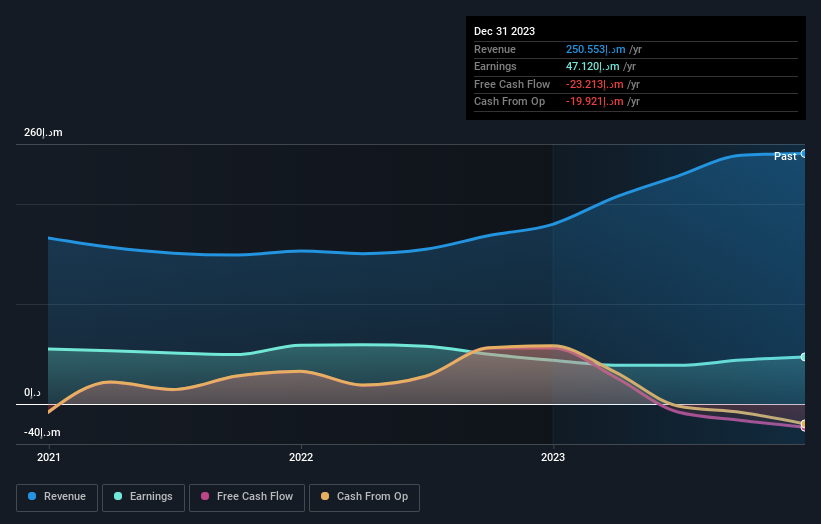- United Arab Emirates
- /
- Insurance
- /
- DFM:DNIR
Painful week for individual investors invested in Dubai National Insurance & Reinsurance Co. (P.S.C.) (DFM:DNIR) after 11% drop, institutions also suffered losses

Key Insights
- Dubai National Insurance & Reinsurance (P.S.C.)'s significant individual investors ownership suggests that the key decisions are influenced by shareholders from the larger public
- The top 2 shareholders own 54% of the company
- Insiders own 26% of Dubai National Insurance & Reinsurance (P.S.C.)
A look at the shareholders of Dubai National Insurance & Reinsurance Co. (P.S.C.) (DFM:DNIR) can tell us which group is most powerful. The group holding the most number of shares in the company, around 28% to be precise, is individual investors. Put another way, the group faces the maximum upside potential (or downside risk).
While institutions who own 28% came under pressure after market cap dropped to د.إ462m last week,individual investors took the most losses.
Let's delve deeper into each type of owner of Dubai National Insurance & Reinsurance (P.S.C.), beginning with the chart below.
View our latest analysis for Dubai National Insurance & Reinsurance (P.S.C.)

What Does The Institutional Ownership Tell Us About Dubai National Insurance & Reinsurance (P.S.C.)?
Many institutions measure their performance against an index that approximates the local market. So they usually pay more attention to companies that are included in major indices.
We can see that Dubai National Insurance & Reinsurance (P.S.C.) does have institutional investors; and they hold a good portion of the company's stock. This can indicate that the company has a certain degree of credibility in the investment community. However, it is best to be wary of relying on the supposed validation that comes with institutional investors. They too, get it wrong sometimes. When multiple institutions own a stock, there's always a risk that they are in a 'crowded trade'. When such a trade goes wrong, multiple parties may compete to sell stock fast. This risk is higher in a company without a history of growth. You can see Dubai National Insurance & Reinsurance (P.S.C.)'s historic earnings and revenue below, but keep in mind there's always more to the story.

Hedge funds don't have many shares in Dubai National Insurance & Reinsurance (P.S.C.). Al Habtoor Investment is currently the largest shareholder, with 28% of shares outstanding. Meanwhile, the second and third largest shareholders, hold 26% and 10%, of the shares outstanding, respectively.
A more detailed study of the shareholder registry showed us that 2 of the top shareholders have a considerable amount of ownership in the company, via their 54% stake.
While it makes sense to study institutional ownership data for a company, it also makes sense to study analyst sentiments to know which way the wind is blowing. Our information suggests that there isn't any analyst coverage of the stock, so it is probably little known.
Insider Ownership Of Dubai National Insurance & Reinsurance (P.S.C.)
While the precise definition of an insider can be subjective, almost everyone considers board members to be insiders. Management ultimately answers to the board. However, it is not uncommon for managers to be executive board members, especially if they are a founder or the CEO.
Insider ownership is positive when it signals leadership are thinking like the true owners of the company. However, high insider ownership can also give immense power to a small group within the company. This can be negative in some circumstances.
It seems insiders own a significant proportion of Dubai National Insurance & Reinsurance Co. (P.S.C.). It has a market capitalization of just د.إ462m, and insiders have د.إ120m worth of shares in their own names. It is great to see insiders so invested in the business. It might be worth checking if those insiders have been buying recently.
General Public Ownership
The general public-- including retail investors -- own 28% stake in the company, and hence can't easily be ignored. While this group can't necessarily call the shots, it can certainly have a real influence on how the company is run.
Private Company Ownership
Our data indicates that Private Companies hold 17%, of the company's shares. It might be worth looking deeper into this. If related parties, such as insiders, have an interest in one of these private companies, that should be disclosed in the annual report. Private companies may also have a strategic interest in the company.
Next Steps:
It's always worth thinking about the different groups who own shares in a company. But to understand Dubai National Insurance & Reinsurance (P.S.C.) better, we need to consider many other factors. Be aware that Dubai National Insurance & Reinsurance (P.S.C.) is showing 2 warning signs in our investment analysis , you should know about...
If you would prefer check out another company -- one with potentially superior financials -- then do not miss this free list of interesting companies, backed by strong financial data.
NB: Figures in this article are calculated using data from the last twelve months, which refer to the 12-month period ending on the last date of the month the financial statement is dated. This may not be consistent with full year annual report figures.
New: Manage All Your Stock Portfolios in One Place
We've created the ultimate portfolio companion for stock investors, and it's free.
• Connect an unlimited number of Portfolios and see your total in one currency
• Be alerted to new Warning Signs or Risks via email or mobile
• Track the Fair Value of your stocks
Have feedback on this article? Concerned about the content? Get in touch with us directly. Alternatively, email editorial-team (at) simplywallst.com.
This article by Simply Wall St is general in nature. We provide commentary based on historical data and analyst forecasts only using an unbiased methodology and our articles are not intended to be financial advice. It does not constitute a recommendation to buy or sell any stock, and does not take account of your objectives, or your financial situation. We aim to bring you long-term focused analysis driven by fundamental data. Note that our analysis may not factor in the latest price-sensitive company announcements or qualitative material. Simply Wall St has no position in any stocks mentioned.
About DFM:DNIR
Dubai National Insurance & Reinsurance (P.S.C.)
Dubai National Insurance & Reinsurance Co.
Flawless balance sheet very low.


